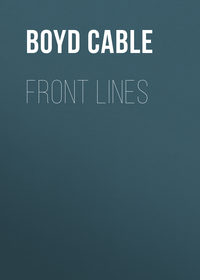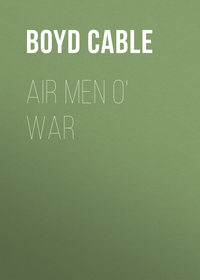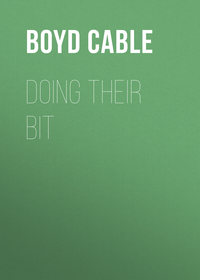
Grapes of wrath
“Strike me!” he exclaimed, with comical surprise, “the bloomin’ thing is red ’ot.”
“Come on!” gasped Billy Simson, struggling to his feet again. “This whole blankey corner’s too red ’ot for my likin’.”
They rose, and pushed hastily on down the winding trench. After that, although they themselves had no especially close shaves, the rest of the line suffered rather severely, for the German gun or guns that had been bombarding the one section of trench now spread their fire and began to pitch high explosives up and down along its whole length. The four had to traverse another short section that had been swept by a low-bursting shrapnel, and after they had passed it, Larry found his knees shaking, and his face wet with cold perspiration.
“Kentuck!” he gulped, “I’m afraid – I’m sorry – I think I’m going to be beastly sick!”
Kentucky, immediately behind him, urged him on.
“Get along, Larry!” he said; “you can’t stop here! You’ll block the whole line!”
But the line for the moment was blocked. That shell-burst had left few alive in the section of trench, but the two or three it had not killed outright had been dragged clear, and down the trench a little way. Now the men who had taken them out had stopped and laid them down and were shouting vainly – and rather wildly – for stretcher-bearers, and endeavoring – some of the more cool-headed amongst them – to fumble out first field-dressings and apply them to the worst of the many wounds. They halted there, busy, and heedless for the moment of anything else, for a full ten minutes, while the trench behind them filled with men pressing on, shouting angrily, and unknowing the cause of the block, to “Move on there!” to “Get out of the way!”
The end of the line next to the wounded men was forced to try and push forward; the trench was narrow, barely wide enough at its floor-level to accommodate the figures stretched out in it and the men who stooped or knelt over them fumbling at them, rolling and tying the field-dressing bandages upon them; but the men made shift somehow to pass them, striding and straddling over their huddled bodies, squeezing past the men who tried to dress the wounds. These still struggled to complete their task, quite absorbed in it, straightening themselves and flattening their bodies against the trench wall to allow a man to scrape past, stooping again about their work.
“Who has got a spare field-dressing?” or “Give us your field-dressing,” was all they took time to say to the men of the passing line, until a wrathful voice above suddenly interrupted them.
One of the officers, fretting at the delay and the slow progress down the trench, had climbed out and run, risking the shells and bullets along the level, to find the cause of the check. He shouted angrily at the men below him:
“Wounded? What’s that got to do with it? That’s no reason you should block the whole company going forward. Where do you think you’re in – a communication trench or a field-dressing-station or a base hospital? Pick those men up – two of you to each man – and carry them along until you can find a place to lay them where you won’t choke the whole trench; or carry them right on out of the communication trench.”
The wounded men were picked up somehow or anyhow by knees and shoulders, and carried and shuffled and bumped along the winding trench, until they emerged into the old British front-line firing trench.
Along this the Stonewalls now spread and took up their positions as supports for the lines that had gone ahead, and were now over somewhere amongst the German first-line trenches. From here they could look out over the couple of hundred yards’ width of what had been the neutral ground, at the old German front-line trench. Beyond its parapet they could see little or nothing but a drifting haze of smoke, but in the open ground between the trenches they could see many figures moving about, and many more lying in still and huddled heaps of khaki. The moving men were for the most part stretcher-bearers, and the Stonewalls were struck with what appeared to them the curious lack of haste and indifference to danger that showed in their movements. During many months, and in many visits to the trenches and spells in the forward fire trench, they had come to regard the neutral ground in daylight as a place whereon no man could walk, or show himself, and live; more than that, they had been taught by strongly worded precept and bitter experience that only to raise a head above the shelter of the parapet, to look for more than seconds at a time over neutral ground, was an invitation to sudden death. It struck them then as a most extraordinary thing that now men should be able to walk about out there, to carry a stretcher in, to hoist it, climbing and balancing themselves and their burden carefully on the parapet, clear and exposed to any chance or aimed bullet.
Kentucky watched some of these groups for a time and then laughed quietly.
“Well!” he drawled, “I’ve been kind of scared stiff for days past at the thought of having to bolt across this open ground, and here I come and find a bunch of fellows promenading around as cool and unconcerned as if there weren’t a bullet within a mile of them.”
“I was thinkin’ just the same thing,” agreed Pug, who was beside him, and looking with interest and curiosity over the open ground; “but if there ain’t many bullets buzzin’ about ’ere now you can bet there was not long ago. There’s a pretty big crowd of ours still lying na-poo-ed out there.”
But the ground was still far from being as safe as for the moment it appeared. The German artillery and the machine-gunners were evidently too busily occupied upon the more strenuous work of checking the advance, or did not think it worth while wasting ammunition upon the small and scattered targets presented by the stretcher-bearers. But when a regiment which prolonged the line to the left of the Stonewalls climbed from the trench, and began to advance by companies in open order across the neutral ground, it was a different story.
An exclamation from Pug and a soft whistle from Kentucky brought Larry to the parapet beside them, and the three watched in fascinated excitement the attempt of the other regiment to cross the open, the quick storm of shells and bullets that began to sweep down upon them the moment they showed themselves clear of the parapet. They could see plainly the running figures, could see them stumble and fall, and lie still, or turn to crawl back to cover; could see shell after shell burst above the line, or drop crashing upon it; could see even the hail of bullets that drummed down in little jumping spurts of dust about the feet of the runners.
A good many more of the Stonewalls were watching the advance, and apparently the line of their heads, showing over the parapet, caught the attention of some German machine-gunners. The heads ducked down hastily as a stream of bullets commenced to batter and rap against the parapet, sweeping it up and down, down and up its length.
“Doesn’t seem quite as safe as we fancied,” said Kentucky.
“I don’t think!” said Pug.
“Anyway,” said Larry, “it’s our turn next!”
He was right, for a few minutes later their officer pushed along and told them to “Stand by,” to be ready to climb out when the whistle blew, and to run like blazes for the other side.
“We’ll run all right,” said Pug to the others, “if them jokers lets us,” and he jerked his head upwards to the sound of another pelting sweep of bullets driving along the face of the parapet above them.
Before the whistle blew as the signal for them to leave the trench, an order was passed along that they were to go company by company, A being first, B second, and C third. A couple of minutes later A Company, out on the right of the battalion, swarmed suddenly over the parapet and, spreading out to open order as they went, commenced to jog steadily across the flat ground. Immediately machine-gun fire at an extreme range began to patter bullets down amongst the advancing men, and before they were quarter-way across the “Fizz-Bang” shells also began to smash down along the line, or to burst over it. There were a number of casualties, but the line held on steadily. Some of the men of the remaining companies were looking out on the advance, but the officers ordered them to keep down, and under cover.
In C Company a lieutenant moved along the line, ordering the men down, and repeating the same sentences over and over again as he passed along.
“Keep down until you get the word; when we start across, remember that, if a man is hit, no one is to stop to pick him up; a stretcher-bearer will see to him.”
“That’s all right!” said Larry to the others, when the officer had passed after repeating his set sentences, “but I vote we four keep together, and give each other a hand, if we can.”
“’Ear, ’ear!” said Pug. “Any’ow, if any of us stops one, but isn’t a complete wash-out, the others can lug ’im into any shell ’ole that’s ’andy, and leave ’im there.”
“We’ll call that a bargain,” said Kentucky briefly. They sat fidgeting for a few seconds longer, hearing the rush and crash of the falling shells, the whistle and smack of the bullets on the open ground beyond them.
“I’m going to have a peep,” said Larry suddenly, “just to see how ‘A’ is getting on.”
He stood on the fire step, with his head stooped cautiously below the level of the parapet; then, raising it sharply, took one long, sweeping glance, and dropped down again beside his fellows.
“They’re nearly over,” he said. “There’s a lot of smoke about, and I can’t see very clear, but the line doesn’t look as if it had been very badly knocked about.”
“There goes ‘B,’” said Billy Simson, as they heard the shrill trill of a whistle. “Our turn next!”
“That open ground is not such a healthy resort as we thought it a few minutes ago,” said Larry. “Personally, I sha’n’t be sorry when we’re across it.”
He spoke in what he strove to make an easy and natural voice, but somehow he felt that it was so strained and unnatural that the others would surely notice it. He felt horribly ashamed of that touch of faintness and sickness back in the communication trench, and began to wonder nervously whether the others would think he was a coward, and funking it; still worse, began to wonder whether actually they would be right in so thinking. He began to have serious doubts of the matter himself, but, if he had known it, the others were feeling probably quite as uncomfortable as himself, except possibly Pug, who had long since resigned himself to the comforting fatalism that if his name were written on the bullet it would find him. If not, he was safe.
None of the four looked to see how “B” Company progressed. They were all beginning to feel that they would have to take plenty of chances when it came their turn to climb the parapet, and that it was folly to take an extra risk by exposing themselves for a moment before they need.
A shout came from the traverse next to them.
“Get ready, ‘C’ Company; pass the word!”
The four stood up, and Larry lifted his voice, and shouted on to the next traverse.
“Get ready, ‘C’; pass the word!”
“Don’t linger none on the parapet, boys,” said Kentucky. “They’ve probably got their machine gun trained on it.”
The next instant they heard the blast of a whistle, and a shout rang along the line.
“Come on, ‘C’; over with you!”
The four leaped over the parapet, scrambling and scuffling up its broken sides.
Near the top Pug exclaimed suddenly, grasped wildly at nothing, collapsed and rolled backward into the trench. The other three half-halted, and looked round.
“Come on,” said Kentucky; “he’s safest where he is, whether he’s hurt much or little.”
The three picked their way together out through the remains of the old barbed-wire entanglements, and began to run across.
“Open out! Open out!” the officers were shouting, and a little reluctantly, for the close elbow-touching proximity to each other gave a comforting sense of helpfulness and confidence, they swerved a yard or two apart, and ran on steadily. The bare two hundred yards seemed to stretch to a journey without end; the few minutes they took in crossing spun out like long hours.
Several times the three dropped on their faces, as they heard the warning rush of a shell. Once they half-fell, were half-thrown down by the force of an explosion within twenty yards of them. They rose untouched, by some miracle, and, gasping incoherent inquiries to one another, went on again. Over and over again fragments from the shells bursting above the line rattled down upon the ground amongst their feet. At least two or three times a shell bursting on the ground spattered them with dust and crumbs of earth; the whole way across they were accompanied by the drumming bullets that flicked and spurted little clouds of dust from the ground about them, and all the time they were in the open they were fearfully conscious of the medley of whining and singing and hissing and zipping sounds of the passing bullets. They knew nothing of how the rest of the line was faring. They were too taken up with their own part, were too engrossed in picking a way over the broken shell-cratered ground, past the still khaki forms that lay dotted and sprawled the whole way across.
There was such a constant hail and stream of bullets, such a succession of rushing shells, of crashing explosions, such a wild chaos of sounds and blinding smoke and choking reek, that the whole thing was like a dreadful nightmare; but the three came at last, and unharmed, to the chopped and torn-up fragments of the old German wired defenses, tore through them somehow or anyhow, leaped and fell over the smashed-in parapet, and dropped panting and exhausted in the wrecked remains of the German trench. It was some minutes before they took thought and breath, but then it was evident that the minds of all ran in the same groove.
“I wonder,” said Larry, “if Pug was badly hit?”
“I’ve no idea,” said Kentucky. “He went down before I could turn for a glimpse of him.”
“I don’t suppose it matters much,” said Billy Simson gloomily. “He’s no worse off than the rest of us are likely to be before we’re out of this. Seems to me, by the row that’s goin’ on over there, this show is gettin’ hotter instead of slackin’ off.”
CHAPTER V
ON CAPTURED GROUND
“I wonder what the next move is?” said Larry. “I don’t fancy they will leave us waiting here much longer.”
“Don’t you suppose,” asked Kentucky, “we’ll wait here until the other companies get across?”
“Lord knows,” said Larry; “and, come to think of it, Kentuck, has it struck you how beastly little we do know about anything? We’ve pushed their line in a bit, evidently, but how far we’ve not an idea. We don’t know even if their first line is captured on a front of half a mile, or half a hundred miles; we don’t know what casualties we’ve got in our own battalion, or even in our own company, much less whether they have been heavy or light in the whole attack.”
“That’s so,” said Kentucky; “although I confess none of these things is worrying me much. I’m much more concerned about poor old Pug being knocked out than I’d be about our losing fifty per cent. of half a dozen regiments.”
Billy Simson had taken the cork from his water-bottle, and, after shaking it lightly, reluctantly replaced the cork, and swore violently.
“I’ve hardly a mouthful left,” he said. “I’m as dry as a bone now, and the Lord only knows when we’ll get a chance of filling our water-bottles again.”
“Here you are,” said Larry; “you can have a mouthful of mine; I’ve hardly touched it yet.”
Orders came down presently to close in to the right, and in obedience the three picked up their rifles and crept along the trench. It was not a pleasant journey. The trench had been very badly knocked about by the British bombardment; its sides were broken in, half or wholly filling the trench; in parts it was obliterated and lost in a jumble of shell craters; ground or trench was littered with burst sandbags, splintered planks and broken fascines, and every now and again the three had to step over or past bodies of dead men lying huddled alone or in groups of anything up to half a dozen. There were a few khaki forms amongst these dead, but most were in the German gray, and most had been killed very obviously and horribly by shell or bomb or grenade.
“They don’t seem to have had many men holding this front line,” remarked Larry, “or a good few must have bolted or surrendered. Doesn’t seem as if the little lot here could have done much to hold the trench.”
“Few men and a lot of machine guns, as usual, I expect,” said Kentucky. “And if this is all the trench held they claimed a good bunch of ours for every one of theirs, if you judge by the crowd of our lot lying out there in the open.”
The three were curiously unmoved by the sight of these dead – and dead, be it noted, who have been killed by shell fire or bomb explosions might as a rule be expected to be a sight upsetting to the strongest nerves. They were all slightly and somewhat casually interested in noting the mode and manner of death of the different men, and the suspicion of professional jealousy evinced by a remark of Billy Simson’s was no doubt more or less felt by all, and all were a little disappointed that there was not more evidence of the bayonet having done its share. “The bloomin’ guns seem to have mopped most o’ this lot,” said Billy. “An’ them fellers that charged didn’t find many to get their own back on.” They were all interested, too, in the amount of damage done by the shells to the trench, in the methods of trench construction, in the positions and state of the dug-outs. And yet all these interests were to a great extent of quite a secondary nature, and the main theme of their thoughts was the bullets whistling over them, the rush and crump and crash of the shells still falling out on the open, the singing and whirring of their splinters above the trench. They moved with heads stooped and bodies half-crouched, they hurried over the earth heaps that blocked the trench, and in crossings where they were more exposed, halted and crouched still lower under cover when the louder and rising roar of a shell’s approach gave warning that it was falling near.
When they had moved up enough to be in close touch with the rest of the company and halted there, they found themselves in a portion of trench with a dug-out entrance in it. The entrance was almost closed by a fall of earth, brought down apparently by a bursting shell, and when they arrived they found some of the other men of the company busy clearing the entrance. “Might be some soo-veniers down ’ere,” one of the men explained. “An’, any’ow, we’d be better down below an’ safer out o’ reach o’ any shell that flops in while we’re ’ere,” said another.
“Suppose there’s some bloomin’ ’Uns still there, lyin’ doggo,” suggested Billy Simson. “They might plunk a shot at yer when you goes down.”
“Shouldn’t think that’s likely,” said Larry. “They would know that if they did they’d get wiped out pretty quick after.”
“I dunno,” said one of the men. “They say their officers an’ their noospapers ’as ’em stuffed so full o’ fairy tales about us killing all prisoners that they thinks they’re goin’ to get done in anyhow, an’ might as well make a last kick for it. I vote we chuck a couple o’ bombs down first, just to make sure.”
Everybody appeared to think this a most natural precaution to take, and a proposal in no way cruel or brutal; although, on the other hand, when Larry, with some feeling that it was an unsporting arrangement, suggested that they call down first and give any German there a chance to surrender, everybody quite willingly accepted the suggestion. So work was stopped, and all waited and listened while Larry stuck his head into the dark opening and shouted with as inquiring a note as he could put into his voice the only intelligible German he knew, “Hi, Allemands, kamerad?” There was no answer, and he withdrew his head. “I don’t hear anything,” he said; “but perhaps they wouldn’t understand what I meant. I’ll just try them again in French and English.” He poked his head in again, and shouted down first in French and then in English, asking if there was anybody there, and did they surrender. He wound up with a repetition of his inquiring, “Kamerad, eh? kamerad?” but this time withdrew his head hurriedly, as an unmistakable answer came up to him, a muffled, faraway sounding “Kamerad.” “There’s some of them there, after all,” he said, excitedly, “and they’re shouting ’Kamerad,’ so I suppose they want to surrender all right. Let’s clear away enough of this to get them out. We’ll make ’em come one at a time with their hands well up.”
There was great excitement in the trench, and this rather increased when a man pushed round the traverse from the next section with the news that some Germans had been found in another dugout there. “They’re singin’ out that they want to kamerad,” he said; “but we can’t persuade ’em to come out, an’ nobody is very keen on goin’ down the ’ole after ’em. We’ve passed the word along for an officer to come an’ see what ’e can do with ’em.”
“Let’s hurry up and get our gang out,” said Larry enthusiastically, “before the officer comes”; and the men set to work with a will to clear the dugout entrance. “It’s rather a score for the Stonewalls to bring in a bunch of prisoners,” said one of the men. “We ought to search all these dugouts. If there’s some in a couple of these holes it’s a fair bet that there’s more in the others. Wonder how they haven’t been found by the lot that took the trench?”
“Didn’t have time to look through all the dugouts, I suppose,” said Larry. “And these chaps would lie low, thinking the trench might be retaken. I think that hole is about big enough for them to crawl out. Listen! They’re shouting ‘Kamerad’ again. Can’t you hear ’em?”
He looked down the dark stairway of the entrance and shouted “Kamerad” again, and listened for the reply. “I wonder if the door is blocked further down,” he said. “I can hear them shout, but the sound seems to be blocked as if there was something between us and them still. Listen again.”
This time they all heard a faint shout, “Kamerad. Hier kom. Kamerad.”
“Hier kom – that means come here, I fancy,” said Larry. “But why don’t they hier kom to us? Perhaps it is that they’re buried in somehow and want us to get them out. Look here, I’m going to crawl down these steps and find out what’s up.”
He proceeded to creep cautiously down the low and narrow passage of the stair, when suddenly he saw at the stair foot the wandering flash of an electric torch and heard voices calling plainly in English to “Come out, Bochie. Kamerad.”
The truth flashed on Larry, and he turned and scuttled back up the stair gurgling laughter. “It’s some of our own lot down there,” he chuckled to the others. “This dug-out must have another entrance in the next traverse, and we and the fellows round there have been shouting down the two entrances at each other. Hold on now and listen and hear them scatter.” He leaned in at the entrance again, and shouted loudly. “As you won’t come out and surrender, Boche, we’re going to throw some bombs down on you.” He picked up a heavy stone from the trench bottom and flung it down the steps. There was a moment of petrified silence, then a yell and a scuffling rush of footsteps from the darkness below, while Larry and the others sat and rocked with laughter above. They pushed round the traverse just as a couple of badly scared and wholly amazed Stonewalls scrambled up from the dug-out, and commenced a voluble explanation that “the blighters is chuckin’ bombs, … told us in English, good plain English, too, they was goin’ to ’cos we wouldn’t surrender.”
Just then an officer pushed his way along to them, and the joke was explained with great glee by Larry and the men from the other part of the trench. Every one thought it a huge joke, and laughed and cracked jests, and chuckled over the episode. Kentucky listened to them with some wonder. He had thought that in the past months of peace and war he had come to know and understand these comrades of his fairly well. And yet here was a new side in their many-sided characters that once more amazed him. A couple of dead Germans sprawled in the bottom of the trench a yard or two from them; their own dead lay crowded thick on the flat above; the bullets and shells continued to moan and howl overhead, to rush and crash down close by, the bullets to pipe and whistle and hiss past and over; while only a few hundred yards away the enemy still fought desperately to hold their lines against our attacks, and all the din of battle rolled and reverberated unceasingly. And yet the men in that trench laughed and joked. They knew not the moment when one of those shells falling so close outside might smash into the trench amongst them, knew that all of those there would presently be deep in the heart of the battle and slaughter that raged so close to them, knew for a certainty that some of them would never come out of it; and yet – they laughed. Is it any wonder that Kentucky was amazed?





